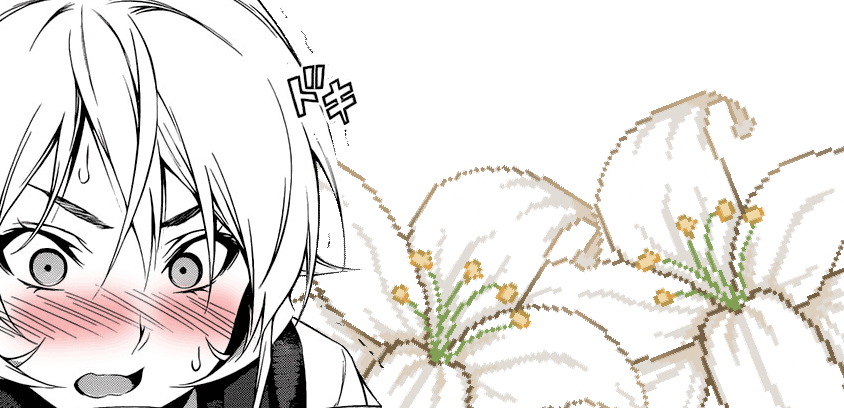Vocabulary Used
There's going to be a number of terms that I'll be using that might fly over your head so here are explanations for them.Yuri: Lesbian love. Y'know, the whole point of this website?
Mango: A tongue-in-cheek mispelling of 'manga'.
Animu: A tongue-in-cheek mispelling of 'anime'.
Het: Short for 'hetero'. Male and female romance (heterosexual). Basically what you don't want to see in your yuri animus.
Futa/Futanari: Girls with dicks. Normally a thing seen in hentai. Not something most people want to see in their yuri media. Not to be confused with transwomen. Futanari is NOT trans.
Subtext: Refers to media with heavy yuri undertones but it's 'not actually yuri' because the romance is unconfirmed and whatnot. Subtext media can have kiss scenes or declarations of love but still be subtext because they're not done in a romantic light, is ambigious or played as a joke.
Bait: Literally means bait. It’s not ‘real’, it’s just bait that looks like the thing, but when you bite into it, you find out it’s not actually yuri or even good subtext. It’s simply bait. My definition of bait is a bit more hardcore than others. To most, subtext and bait are the same thing. To me, I think bait is a bit more malicious than that. (See: Hibike Euphonium with all the yuri subtext but then turning the girls around for het)
Class S: A subgenre of yuri that depicts girls in high school that are ‘so exceptionally close that it can be viewed as romantic’. Usually the troupe goes as follows: it’s set in a catholic all-girls school, the girls exchange rosaries to become ‘sisters’. Coupled with the whole “good day/gokigenyou”s and the “desuwa”s and “ara ara”s or "ohohoho"s.
Yaya: A term for the loser in the love triangle. People noticed that the losers in yuri media tend to have ‘yaya’ in their name and began referring to them as such. (See: Yaya from Strawberry Panic, Sayaka from Bloom into You, Yayaka from Flip Flappers)
Onee-sama: It’s just the Class S way of referring to ‘older sister’ or ‘big sister’ in yuri media. I refer to other yuri enjoyers as such (they have to be as cultured and have good taste as well, mind you)
Me: "I need a good recommendation."
Someone: "Here is that hardcore lesbian BDSM mango you wanted."
Me: "Thank you onee-sama."
Imouto: Opposite of onee-sama, it means 'little sister'. I personally rarely use this in speech. Usually it comes from onee-samas playfully chiding someone for being a stupid little baka idiot.
Girl A: "Flip Flappers is a yuri anime"
Girl B: "No it is not imouto, it's subtext."
Yuri goggles: A term for deluding yourself viewing subtext content in a gay light.
Scenario: Two women in the same room alone.
Normal vision: They're pretty good friends!
Goggles turned up to 200% vision: They are fucking so passionately.
If you can't do that just yet, that's just skill issue. Go watch Flip Flappers/Izetta/Saki to train yourself. And then graduate from that to more difficult to see subtext like Love Live or something.
Purist: Term for a type of yuri readers. Purists tend to hate anything to do with men in the slightest. It can get pretty extreme too. Like no men should exist in the story’s universe, no futa, no bisexuals, no transwomen (since they’re ‘not women’), the writer/artist should be a woman, etc.
OL: Short for 'office lady'.
MC: Short for 'main character'.
MTL: Stands for 'machine translation'.
Nice boat: A reference to what happened in the last episode of School Days (not a yuri anime/manga), where one of the love interests kills the main character. 'Nice boat' can refer to any yandere act of love. It originated from how the last episode was delayed and the time slot aired stock videos of pleasant boats sailing in Japan instead.
Spaghetti: Usually used like 'spilling spaghetti' or 'dropping spaghetti'. I also use 'spaghetti-ing' myself. It means to mess up really badly socially, usually in a rather autistic fashion.
And that's all the terms! I might add more in the future. Now that you're up to speed, you might want to reach the FAQ before jumping right in.










